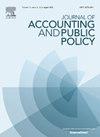个人责任与独立董事:来自中国的证据
IF 2.2
3区 管理学
Q1 BUSINESS, FINANCE
引用次数: 0
摘要
关于加强独立董事的个人责任以增强其治理作用的争论仍在继续,人们担心这可能导致更多的人辞职。现有的研究在理解增加这一责任的立法影响及其在不同背景下(特别是在快速增长的新兴市场)的异质性方面存在差距。本研究通过考察《证券法》修订后个人责任增加对独立董事更替和公司治理效率的影响,弥补了这一差距。我们认为,这些修正案标志着对独立董事的宽松处罚的结束,从而促进了公司治理。使用2017年至2021年的中国上市公司数据集,我们观察到独立董事在修订后辞职的显著增加。这种效应在诉讼风险较高、信息不透明、内部腐败程度较高、独立董事薪酬较低的公司中更为突出。独立性弱、经常缺席、使用代理投票、拥有多个独立董事职位、远离所服务公司或拥有学术背景的独立董事在面临个人责任增加时更有可能辞职。进一步分析发现,修订后独立性弱、离公司较远、兼任多个独立董事的独立董事的辞职与股票收益呈正相关。此外,修正案引入的个人责任增加提高了公司治理效率。这些发现为新兴市场的治理改革和勤勉的独立董事的一般作用提供了新的见解。本文章由计算机程序翻译,如有差异,请以英文原文为准。
Personal liability and independent directors: Evidence from China
The debate over strengthening independent directors’ personal liability to enhance their governance role continues, with concerns it may lead to increased resignations. Existing research has left gaps in understanding the legislative effects of increasing this responsibility and its heterogeneity across different contexts, especially in rapidly growing emerging markets. Our study bridges this gap by investigating how increased personal liability influences independent director turnover and corporate governance efficiency following the amendment of China’s Securities Law. We argue that these amendments signify the end of lax penalties for independent directors, thereby boosting corporate governance. Using a dataset of Chinese listed firms spanning 2017 to 2021, we observe a significant increase in independent director resignations post-amendments. This effect is more prominent in firms with higher litigation risk, more opaque information, higher internal corruption, and lower independent director remuneration. Independent directors who are weakly independent, are frequently absent, use proxy voting, hold multiple independent directorships, live far from the firms they serve, or have academic backgrounds are more likely to resign when facing increased personal liability. Further analysis reveals that the resignation of independent directors who are weakly independent, live far from the firm, and hold multiple independent directorships after the amendment is positively associated with stock returns. Additionally, the increased personal liability introduced by the amendment improves corporate governance efficiency. These findings provide new insights into governance reforms in emerging markets and the general role of diligent independent directors.
求助全文
通过发布文献求助,成功后即可免费获取论文全文。
去求助
来源期刊

Journal of Accounting and Public Policy
Multiple-
CiteScore
4.80
自引率
2.80%
发文量
75
期刊介绍:
The Journal of Accounting and Public Policy publishes research papers focusing on the intersection between accounting and public policy. Preference is given to papers illuminating through theoretical or empirical analysis, the effects of accounting on public policy and vice-versa. Subjects treated in this journal include the interface of accounting with economics, political science, sociology, or law. The Journal includes a section entitled Accounting Letters. This section publishes short research articles that should not exceed approximately 3,000 words. The objective of this section is to facilitate the rapid dissemination of important accounting research. Accordingly, articles submitted to this section will be reviewed within fours weeks of receipt, revisions will be limited to one, and publication will occur within four months of acceptance.
 求助内容:
求助内容: 应助结果提醒方式:
应助结果提醒方式:


